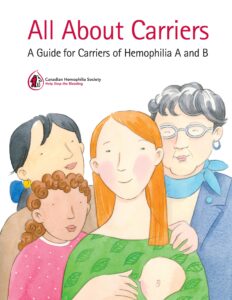Carriers of Hemophilia A & B

Hemophilia A (factor VIII deficiency) and Hemophilia B (factor IX deficiency) are rare inherited bleeding disorders, with different severities that mostly affects males. Severe hemophilia affects women too, although this is rare.
Let’s first explore the genetics of hemophilia and how it affects families regarding women with bleeding disorders. A female who inherits one affected X chromosome becomes a “carrier” of Hemophilia. It is important to remember that Hemophilia affects families: If you are a man that has Hemophilia, all your daughters will be obligate carriers. If you are a woman (obligate or non-obligate carrier), you have a 50 /50 chance that your male children have Hemophilia and a 50/50 chance that your female children are carriers/mild Hemophiliacs. If you have a son with Hemophilia you have a similar chance to have a daughter with Mild Hemophilia, what used to be and sometimes still is called a symptomatic carrier. Similarly, there are chances that you might be affected and have low factor levels and bleeding symptoms yourself, and so have mild Hemophilia yourself.
Carriers of Hemophilia might have bleeding disorders themselves and they are not aware of it, as they usually do not experience severe bleeding symptoms. Carrier level factor tends to have broad range. In her paper “Women and bleeding disorders: diagnostic challenges” Dr. Paula James introduced a proposal to the Women’s Issues in Thrombosis and Hemostasis ISTH Scientific and Standardization Committee, that hemophilia carrier with factor levels >5% to 40% should be referred to as a woman or girl with mild hemophilia. Carriers with factor levels >40% should be referred to as symptomatic or asymptomatic, depending on their bleeding phenotype. We will update you more on these possible recommendations for nomenclature for carriers once more data is available.
Some common bleeding symptoms carriers suffer from include: heavy menstrual bleeding, easy bruising, and excessive bleeding after childbirth. Furthermore, you and/or your daughters may have levels higher than 40% and still have bleeding disorder symptoms that affect your quality of life and cause complications. Lately, it is recognized that regardless of factor level, symptoms of a bleeding disorder may be present, which still puzzles the medical community. If you and your daughters experience any of these symptoms talk to your health care team to receive a timely diagnosis. Treatment is available and you don’t need to suffer in silence.
There is still lot of medical debate and unknowns about women carriers with Hemophilia, but the good news is that there has been significant scientific interest on this topic and movement at WFH, NHF and CHS to tackle issues for women with bleeding disorders. The CHS-MC Women with Bleeding Disorders Committee is working hard to present current information on women with bleeding disorders. Our goal is that all women with bleeding disorders can become empowered with the new knowledge they need to take care of their health and the health of their families, as well as to manage pregnancy and family planning.
Treatment is available and you don’t need to suffer in silence. Please read Pipeline to Care to get access to Manitoba Bleeding Disorder Program.
Below are trusted sources of information for carriers of hemophilia A and B.
Canadian Hemophilia Society
World Federation of Hemophilia
All About Carriers; A Guide for Carriers of Hemophilia A and B
A comprehensive guide for carriers of Hemophilia A and B. Developed and published by the Canadian Hemophilia Society.
There are many excellent resources on the WFH website for carriers. The eLearning platform has a variety of videos, text and visuals to help you learn about carriers.
Carriers and Women with Hemophilia PDF
Carriers and Women with Hemophilia WFH eLearning


